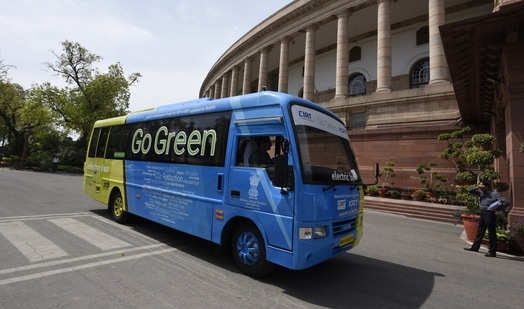A green deal in the Union Budget 2022?
There is a positive shift in the language of the budget, underlining the seriousness of the climate crisis. However, the contents seem to fall short of the packaging
Most high-profile government documents — budgets, economic surveys, erstwhile five-year plans — typically relegate environment, sustainability and climate change to a residual last section — an afterthought.

This is why it is pleasantly surprising to see that the Union Budget of 2022-23 projects low-carbon development as an economic opportunity, discusses clean energy as a sunrise sector and calls for reimagining cities as centres of “sustainable living”. The shift in language is worth noticing. It hints at an important change: The environment as a drag on the economy to one that can be made to work with and even enhance the quality of growth. However, while there are some meaningful nuggets in the Budget, the overall contents fall short of the packaging.
First, the positive nuggets. The government has announced “production-linked incentives” for domestic manufacture of solar photovoltaic cells. While solar energy promotion has always been on the agenda of this government, the attention to creating a manufacturing base, and, therefore, jobs, is important, and welcome.
The Budget also signals a strong bet on electric vehicles (EVs) as a sunrise sector, announcing a more than three-fold increase in subsidy and a battery swapping and interoperability policy. The latter is important as it enables much lower costs in EVs because batteries can be treated as a service and paid for over time rather than as a lumpy capital cost. Significantly, the EV push occurs in the context of a commitment to support public transport in urban areas — although there is no enhanced support for this — and a vision of urban transformation, as yet to be laid out.
Finally, there is recognition of the need to mobilise finance for green investments and some concrete measures for doing so. Among these, ‘green bonds’ have received the most attention, although it is important to see the details before deciding their full implications.
However, there are at least three areas where the details fall well short of the overall marketing. First, to truly examine whether this is a green budget, it is important to look not only at the components flagged as green, but at the centre of gravity of the spending allocations. Most notably, the Gati Shakti package stimulus through infrastructure spending shows little sign of mainstreaming the environment, focusing on transitional infrastructure such as roads, railways, and airports. Mainstreaming sustainability would have required including thinking on how this capital expenditure could shift India to a low-carbon and climate-resilient society, while also providing much-needed stimulus. For example, investing in rural productivity together with decentralised power systems would allow for both social and environmental objectives to be met. Using the Mahatma Gandhi National Rural Employment Guarantee Scheme (MGNREGS) expenditures to support ecological restoration could have enhanced climate resilience. Turning to roads and airports suggests a lack of imagination and a missed opportunity.
Second, while energy transformation looms large in the packaging, bringing about such transformations require comprehensive shifts beyond renewable energy promotion. Notably, the Budget is silent on the need to prepare coal-dependent areas for a ‘just transition’ based on alternative jobs and livelihoods within a regional development framework. Moreover, there is no follow-up on the finance minister’s nudge in past Budgets for retirement and environmental compliance of old and polluting coal power plants. Another area necessary for an energy transformation — reform of discoms — receives limited attention, with anticipated additional expenditures essentially pushed onto states. Renewable energy promotion is necessary, but not a sufficient condition for energy transformation; the complementary parts are missing.
Third, in some areas, the Budget betrays a costly old school ‘growth versus environment’ mindset, that fails to recognise the importance of the environment in a sustainable future. Enhanced measures to address air pollution — a public health crisis in India — are conspicuous by their absence, and, in fact, there is a seeming rollback on subsidies for Liquified Petroleum Gas for cooking, one of the true success stories in recent years.
The aggressive promotion of river interlinking projects — with support announced for the Ken-Betwa link and five more in the pipeline – ignores substantial evidence of ecological harm from river interlinking. And, the language on accelerating green clearances does not help allay fears that ecological quality will receive short shrift when balanced against project clearances.
Ultimately, however, looking for green transformation in a Budget risks looking in the wrong place. Budgets can at best help realise such visions and indicate the balance across competing priorities. But envisioning and defining transformation should happen further upstream, through the creation of institutions that can provide clear strategic thinking, long-term analytical capacity, and clear visioning to chart low-carbon, job-creating, climate-resilient and equitable transitions. In the absence of such strategic thinking, we end up with scattershot approaches that result in a few positive hits but also more than a few misses, as is the case in the current Budget.
Navroz K Dubash is a professor at the Centre for Policy Research
The views expressed are personal
Continue reading with HT Premium Subscription




